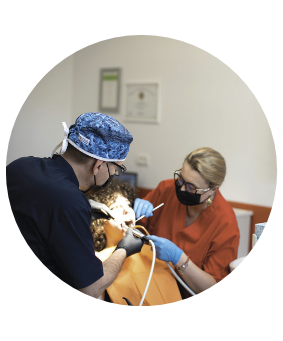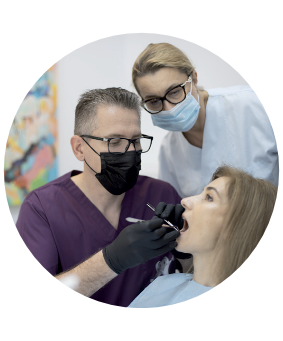
Switching from combustible cigarettes to heated tobacco products (HTP) can boost the oral health of smokers and even increase the success of dental implants. These are the findings of two scientific studies completed by Professor Dr. Mihaela Răescu as part of the Tobacco Harm Reduction Scholarship Programme (THRSP).
It is well established that switching completely to safer nicotine products offers smokers the chance to reduce their risk of suffering from chronic obstructive pulmonary disease (COPD), cardiovascular disease (CVD), and lung cancer. But the work of a Romanian Professor of Dentistry shows the potential benefits of switching also extend to other areas of health and wellbeing.
A member of the Faculty of Dental Medicine at Titu Maiorescu University in Bucharest, Prof. Dr. Răescu developed an interest in tobacco harm reduction after a number of her patients asked if HTP could improve their oral hygiene. Keen to provide reliable information, Prof. Dr. Răescu scoured the scientific literature for answers. Unable to find any papers that addressed her specific clinical questions, she then decided to take matters into her own hands.
“When you’re chatting to patients about these subjects, it helps if you can tell them about your own evidence. So, when I saw an advert calling for applications to the THRSP,
For her first Scholarship project, Prof. Dr. Răescu set out to identify what opportunities THR interventions might provide for routine dentistry. To do this, she offered a group of smoking patients the chance to switch from cigarettes to HTP before assessing any changes to their oral health and hygiene outcomes.
“Since the first part of the body that comes into contact with cigarette smoke is the mouth, I wanted to find out if switching to HTP would have a positive effect on the bacterial plaques that form on teeth. Analysing the results after nine months, my study showed there were fewer plaques for HTP users compared to smokers. Those that did develop were not as thick. This is really good news because thinner plaques are much easier and less painful to remove, so patients who have switched have better oral health and can feel more relaxed about going to the dentists.”
The results of this project were picked up by the media and during her Scholarship, Prof. Dr. Răescu was interviewed by journalists from various Romanian TV channels. She wrote a paper titled “Smoking and Oral Health in Romania; A Dentist’s Assessment” and presented her findings at Education and Creativity for a Knowledge Based Society, an international congress held in Bucharest.
Keen to continue her work on tobacco harm reduction, Prof. Dr. Răescu successfully applied for an Enhanced Scholarship. This time she wanted to investigate the potential for HTP to improve the clinical outcomes for smokers requiring dental implants. Since smoking can affect the circulation of blood in the bone onto which the implants are anchored, these procedures are often unsuccessful for smokers. To overcome this problem, patients are normally asked to abstain from smoking for around six months, something many are unable to achieve.
“To help more smokers benefit from successful implants, I wanted to see if safer nicotine products could help. I offered smokers the chance to switch to HTP rather than trying and failing to go cold turkey from smoking. The study showed that for those who switched, the implants were more successful.


While she has now finished her two projects, Prof. Dr. Răescu plans to keep playing an active role in tobacco harm reduction. To that end she is mentoring current THRSP Scholar Dr. Niky Cumpătă as he examines the effect of smoking traditional cigarettes versus noncombustibles on the oral mucosa. A specialist in Oral and Maxillo-Facial Surgery, Dr Cumpătă, who also works at Titu Maiorescu University, helped Prof. Dr. Răescu complete the study on dental implants and was inspired to apply for a scholarship after their collaboration.
“I felt very honoured to be asked to mentor Niky. I’m really pleased I can help him while continuing my involvement with the THRSP, as we still have a lot to do. There are more than 4 million smokers in Romania, that’s 25% of all adults, and 17% of all deaths in the country are attributable to tobacco smoking, but almost nobody here is talking about tobacco harm reduction. As a result of my scholarships, though,